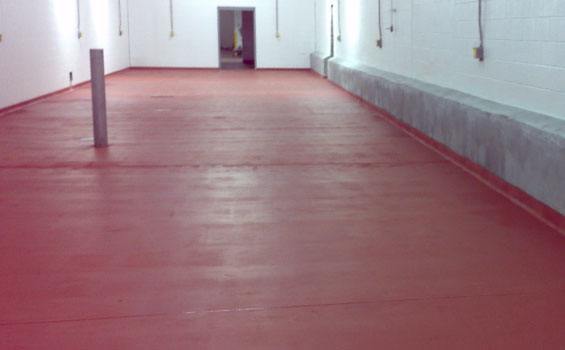
BASF urethane mortar in Vlasic production facility
Pickling Facility Flooring
Since pioneering the pickles in a jar concept during World War Two, Vlasic has been supplying the country’s demand for pickles. Their innovative idea of using a glass jars makes it clean and convenient for the consumer to enjoy. But turning those cucumbers into pickles can get messy. A company like Vlasic needs the absolute best in pickling facility flooring.
Vlasic’s pickling facility in Michigan jars out millions of pickles each year. The process of turning raw cucumbers into delicious, tangy pickles requires high temperatures and harsh chemicals. The brines, vinegars, & cleaning chemicals in this environment will quickly destroy concrete and under performing floors.
Flooring Challenges of the Food Industry
Cucumbers are soaked in a brine and then stored in a vinegar and vegetable acid solution. The equipment is frequently washed down with hot water and cleaning solutions. A clean and safe environment is required for Vlasic to produce high quality, great tasting pickles.
Wet environments in food production facilities can cause serious problems for the floors. Cracks and joints provide spaces for water to harbor and bacteria to grow. Acidic chemicals will quickly wear channels into concrete when traveling to the drains. Poorly constructed drains provide a great place for water to deposit and leak under the floor.
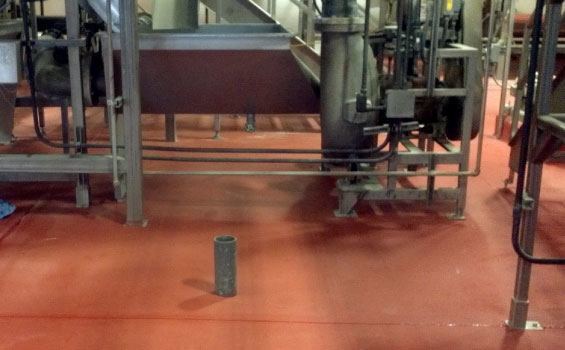
Hot water and harsh chemicals produce a challenging wet environment in a pickling facility.
When a facility is experiencing any of these problems, fines and lost production time become a concern. The Food & Drug Administration will severely punish a facility that threatens food quality and public safety.
Over the last decade, the US government has introduced new laws that standardizes food production facilities and practices. Federal agencies and local health organizations are responsible for maintaining these practices throughout the industry. Food producers are being required to replace old floor systems with new, high-performing systems that reduced contamination and hazards.
Repairing Floor Failures
Vlasic was in search of Pickling Facility Flooring that would perform within the new standards. When their main production area was scheduled to be renovated, Michigan Specialty Coatings proposed an innovative, seamless urethane mortar system by BASF. Specially designed for the food industry, this system eliminates joints and creates an easy to clean floor surface. Unfortunately, the proposal from MSC Floors was not accepted by Vlasic.
Vlasic decided to go with a competitor’s recommendation for a trowel-down system. The provider installed a 3/8 inch blended epoxy-aggregate system. It is a common floor system that mixes epoxy polymer and sand to form a tight, compact coating. While normally used in environments where thermal cycling and chemical exposure are not of concern, the epoxy blend coating was laid at a large quantity with hopes to provide protection from the harsh environment of the pickling facility.
Shortly after the trowel-down systems was installed at Vlasic, the floor began to create production and safety issues. The coating was failing around the heavy equipment and in wet areas. Water began to retain around drains and throughout the joints. This is a major concern for food quality because when warm water and food is able to sit in the open air, bacteria can grow. Safety concerns arose when the trowel down system began to chip and flake.
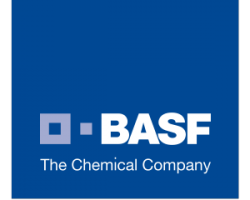
As the failures continued, Vlasic returned to Michigan Specialty Coatings for their urethane mortar solution of the pickling facility flooring. The benefits of using urethane mortar start with the seamless, single-layer application. This provides easy maintenance of the floors and removes any joints or cracks for water to pool. The durable surface is able to withstand extreme temperature changes and strong enough to provide protection from the harsh chemicals and acids used in pickling. This system also provides slip resistance for worker’s safety.
Preparation for Performance
Vlasic had already spent weeks installing the trowel down system, so there was little time to replace and install another floor. MSC initially requested 14 days, but Vlasic was unable to provide that amount of time. Because of the lost time, Vlasic could only afford to provide MSC Floors with 8 days to complete the removal, preparation, and installation of the urethane mortar.
To ensure the project would be completed, Michigan Specialty Coatings worked 24 hours a day for 8 straight days. The two 10-man crews alternated day and night shifts to ensure the 13,500 square feet was completed in time for other contractors to access the site and equipment to be installed.
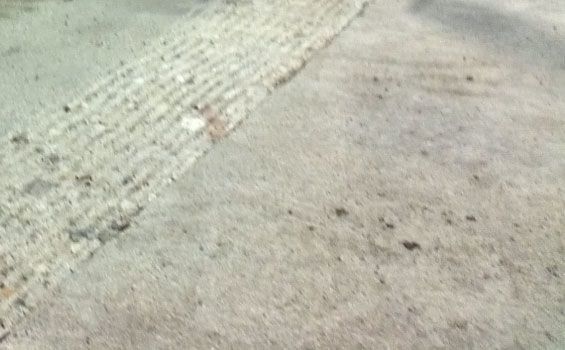
Poor preparation leads to failure. Scarification grooves (left) provide greater adhesion than shot blasting (right).
Sase concrete grinders were used to remove the failing coating. While removing the coating, MSC discovered one reason why the floors began to fail so quickly. The previous installers only shot blasted the concrete which created to a weak bond. Vlasic experienced flaking because of poor adhesion between the blended epoxy coating and the substrate.
Poor preparation and weak bonding limits the performance of a coating and leads to higher maintenance costs. Floor systems and coatings can only perform as well as the substrate is prepared. After removal, MSC scarified the substrate to I.C.R.I. standards to ensure strong bonding and lasting performance.
The drains at Vlasic were found to be poorly constructed which allowed water to retain in and around the drains. Water was leaking behind the drain and reaching the concrete substrate. MSC used hand grinders to remove the failed coating and hand scarifiers to prepare the substrate around the drain. Then the urethane mortar was installed properly around the drain to prevent any future leaking.
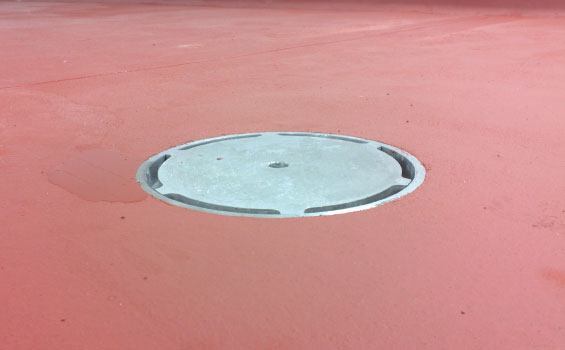
Careful preparation and installation around drains eliminate threat of water damage.
Building a Foundation on Quality Floors
Vlasic was extremely satisfied to finally have a floor that provided the performance they required. A good floor will go unnoticed because there are no problems. Michigan Specialty Coatings and Vlasic continue to work together and have completed over 50,000 square feet of urethane mortar since the initial placement.
Vlasic illustrates the importance of having well performing floors in the food and beverage industry. Production delays are minimized and food safety is ensured when using the right floor system. Their experiences also provides valuable insight into what project managers should be aware of when searching for the right contractor and floor solution.
- Be sure the surface is prepared to the ICRI standards for the recommended floor coating, especially pickling facility flooring. This will ensure the coating bonds to the substrate.
- Find a contractor that is experienced with preparing and installing coatings around drains. Poor preparation of drains will lead to water retention that can foster bacteria growth and destroy the coating bond.
- Seamless floors are mandatory in most food and beverage facilities. They provide a better environment for food safety and quality while remaining easy to clean and maintain.
- Thicker coatings are not necessarily better and will not perform well in environments for which they are not designed. Different floor systems exist for different applications. Best practice is to use the right systems for their recommended application. Many inexperienced installers will use the same coating for all environments; only increasing the amount of product used. This will not provide lasting performance but will cause delays and increase maintenance costs.
Michigan Specialty Coatings has extensive knowledge and experience with the variety of coatings available (we are master contractors for these leading product manufacturers). MSC’s reputation as a leading industrial and commercial flooring provider comes from delivering durable and long-lasting floors. Through careful preparation and diligent installation, they provide their clients with flooring solutions guaranteed to perform. Contact us now to learn what solutions are available for your facility.
Click here to download a PDF Flyer for the above Pickling Facility Flooring Case Study.
